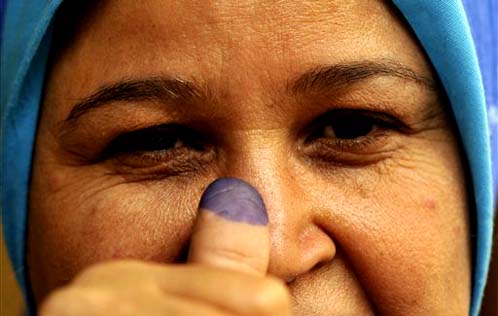Democratic Progress Despite Arab Upheavals
 The Arab upheavals of 2011 have been very different from one another across countries, but have in common a language of parliamentary democracy as the ultimate ideal (albeit one that sounds more like the old West German Social Democratic Party ideal than like the Neoliberal parliamentary regimes of the US and its close allies). Democracy is not a black and white quality but rather a range of practices that can be highly mature (“consolidated”) or still imperfect and fragile (“unconsolidated”). Whether the aspirations of many Arab young people and intellectuals for greater political freedom will be realized or not, the breadth, depth and fervor of the aspiration is remarkable in itself.
The Arab upheavals of 2011 have been very different from one another across countries, but have in common a language of parliamentary democracy as the ultimate ideal (albeit one that sounds more like the old West German Social Democratic Party ideal than like the Neoliberal parliamentary regimes of the US and its close allies). Democracy is not a black and white quality but rather a range of practices that can be highly mature (“consolidated”) or still imperfect and fragile (“unconsolidated”). Whether the aspirations of many Arab young people and intellectuals for greater political freedom will be realized or not, the breadth, depth and fervor of the aspiration is remarkable in itself.
Events are moving quickly in the region, and here are some notable developments with implications for democracy in the Middle East:
1. Despite the Interior Ministry’s crackdown on protesters last week, Egypt held the first round of elections for the lower house of parliament on Monday. Some activists had called for a(n inevitably self-defeating) boycott of Monday’s polls, but luckily the Egyptian public paid no attention. The LAT says that the turnout at the voting booth was heavy. As Ahmed Amr argued here Monday, the ruling military council has attempted to undermine the outbreak of democracy. But an elected parliament has a great deal of legitimacy and it won’t be as easy to over-rule as youth protesting in a square. Over time, there is at least a chance that civilian politicians with great popularity can begin whittling away at military perquisites, as happened in Turkey.
2. Yemen has witnessed some surprising developments in the past week. Ali Abdullah Saleh finally signed on the dotted line and accepted the Gulf Cooperation Council’s plan for resolving that country’s crisis. Saleh agreed to step down and turn power over to his vice president, Abd-Rabbu Mansour Hadi, who in turn has set elections for February 21. The revolutionaries in Yemen are not happy with the consensual, kiss and make up, approach of Saudi Arabia and its allies. An amnesty has been announced that includes Saleh, whom the protesters want put on trial for crimes against humanity. The ruling council going into elections is made up half of dissident parties and half of members of the old ruling party. Nobelist and journalist Tawakkul Karman has led a charge to repeal the amnesty and, indeed, has asked the International Criminal Court to indict Saleh. But a month ago, it could not have been foreseen that Saleh would step down nor that elections would be set so soon. Yemen is a complex place and not out of the woods, but it would be foolish to deny that some progress has been made.
3. Morocco had elections and the Muslim fundamentalist party, the Party of Justice and Development (PJD), got a little over a fourth of the seats. Turnout was light at 45 percent but up from 37 percent the last time. The big change in that country is that the king has now pledged to appoint the prime minister from the party that won the biggest number of seats. It wants to lower tax rates on the rich, earning it a seal of approval from Forbes. Thus, as in Tunisia, self-proclaimed moderate Muslim politicians will have the opportunity to show whether they can rule and face the electorate again in the next election. Morocco’s baby steps away from absolute monarchy should not be exaggerated. But it is remarkable that even the mild reforms so far enunciated by the king should ever have been enacted at all, and surely we see a faint echo of the Arab revolutions putting fear in the heart of the Moroccan Establishment.
4. The Arab League has cut off Syria’s economy and froze Syrian assetsin response to what a new UN report says is the killing of some 3500 protesters since last spring.
The Arab League is no longer nothing more than a club of dictators. 4 of its 22 members have now had changes at the top induced by popular uprisings, with elections held or promised. Three (Kuwait, Lebanon, Morocco) had already been classified as “partly free” by Freedom House. Another, Iraq, holds regular parliamentary elections, though its democracy is compromised in other ways. So 8 of the 22, about a third, can’t be dismissed as simple dictatorships or absolute monarchies. While the absolutist states have their own reasons for wanting the Baath Party of Syria to fall, especially its alliance with Iran, the youth and populace of the countries that have experienced upheavals are strongly anti-Bashar al-Assad and they are a constituency that the new or transitional governments cannot afford to alienate.



You must be logged in to post a comment Login